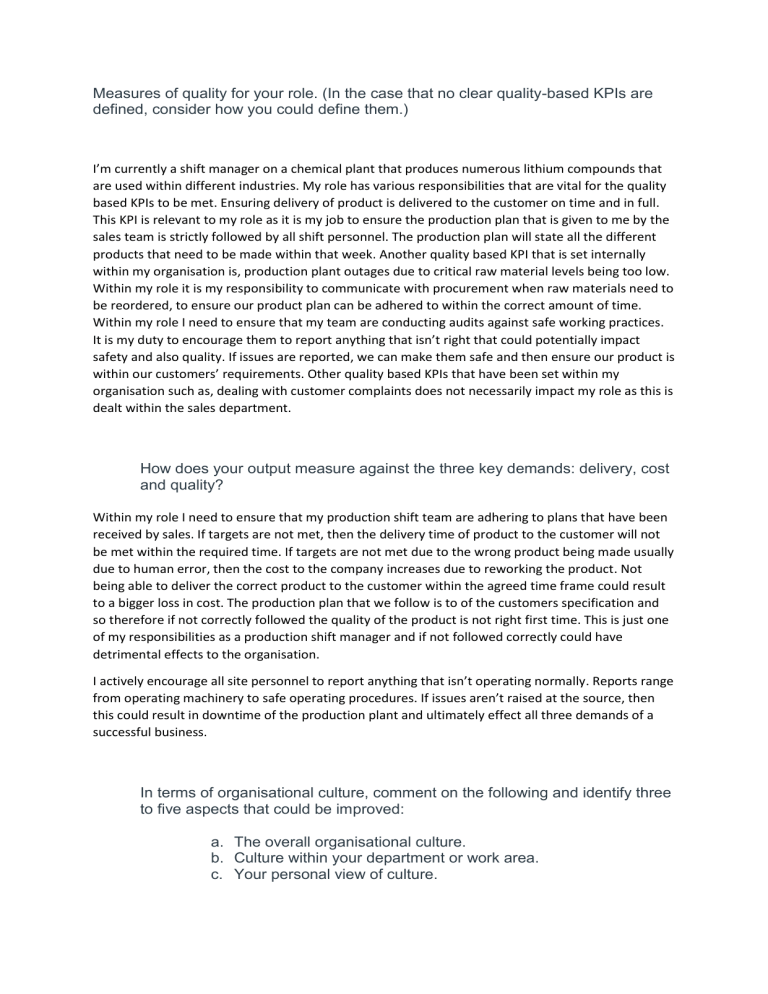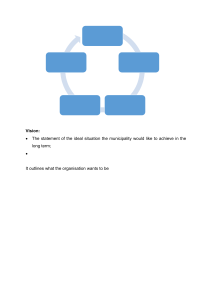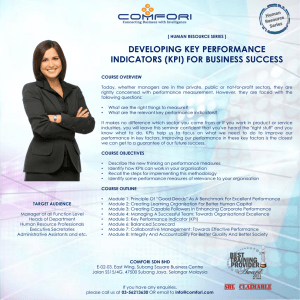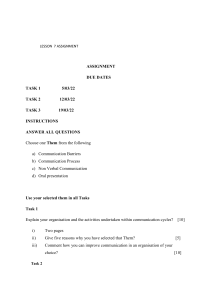
Measures of quality for your role. (In the case that no clear quality-based KPIs are defined, consider how you could define them.) I’m currently a shift manager on a chemical plant that produces numerous lithium compounds that are used within different industries. My role has various responsibilities that are vital for the quality based KPIs to be met. Ensuring delivery of product is delivered to the customer on time and in full. This KPI is relevant to my role as it is my job to ensure the production plan that is given to me by the sales team is strictly followed by all shift personnel. The production plan will state all the different products that need to be made within that week. Another quality based KPI that is set internally within my organisation is, production plant outages due to critical raw material levels being too low. Within my role it is my responsibility to communicate with procurement when raw materials need to be reordered, to ensure our product plan can be adhered to within the correct amount of time. Within my role I need to ensure that my team are conducting audits against safe working practices. It is my duty to encourage them to report anything that isn’t right that could potentially impact safety and also quality. If issues are reported, we can make them safe and then ensure our product is within our customers’ requirements. Other quality based KPIs that have been set within my organisation such as, dealing with customer complaints does not necessarily impact my role as this is dealt within the sales department. How does your output measure against the three key demands: delivery, cost and quality? Within my role I need to ensure that my production shift team are adhering to plans that have been received by sales. If targets are not met, then the delivery time of product to the customer will not be met within the required time. If targets are not met due to the wrong product being made usually due to human error, then the cost to the company increases due to reworking the product. Not being able to deliver the correct product to the customer within the agreed time frame could result to a bigger loss in cost. The production plan that we follow is to of the customers specification and so therefore if not correctly followed the quality of the product is not right first time. This is just one of my responsibilities as a production shift manager and if not followed correctly could have detrimental effects to the organisation. I actively encourage all site personnel to report anything that isn’t operating normally. Reports range from operating machinery to safe operating procedures. If issues aren’t raised at the source, then this could result in downtime of the production plant and ultimately effect all three demands of a successful business. In terms of organisational culture, comment on the following and identify three to five aspects that could be improved: a. The overall organisational culture. b. Culture within your department or work area. c. Your personal view of culture. The overall culture within my organisation is extremely safety driven. The plant is a lower tier COMAH site and so therefore safety is at the forefront of everyone’s minds. Safety is instilled into all employees frequently. The organisation requires all site personnel (including contractors) to submit one near miss report per week minimum. This is a good way to be able to diagnose safety/quality issues at the source. Although I do believe people seem to get fixated on submitting the near miss instead of finding quality/safety issues that are more appropriate to report. Communication to the people that may not quite understand that a quality near miss is more important than the number of near misses they have raised within a week could be further improved within the organisation. Also, within the organisation departments are very much kept within themselves. I feel as though different departments coming together more and getting familiarised with different faces could definitely help the departments when trying to communicate cross the company. Overall, there is a very good safety culture within the organisation, but I do believe there are aspects that could be worked on to benefit the business further. Within the production department that I work within as addressed before safety is the most important part in every aspect of the job closely followed by quality. My team and I are very aware of what we need to do to ensure we are meeting the required safety and quality culture standards that are required. I do believe that communication between process operators on different shifts could be improved. This would enable different shifts to work as one big production team as well as single shift teams, this would benefit the department in achieving goals more quickly. Near miss reporting within my department as I spoke about before is required frequently. A goal that my department is striving towards is to ensure these reports are beneficial towards the company and not just operators chasing numbers as they know they need to submit at least one per week. I believe obtaining a high quality and safety-based culture within a working environment is a main player in the success of a business. If employees are aware of all safe operating practices and apply their job role correctly, then this will only move the business in a positive direction. I believe communication between different departments and employees can help the culture of the organisation move forward. To gain a high quality and safety based culture within an organisation takes time and a change in mindset which needs to be heard from all levels within departments across the business.


